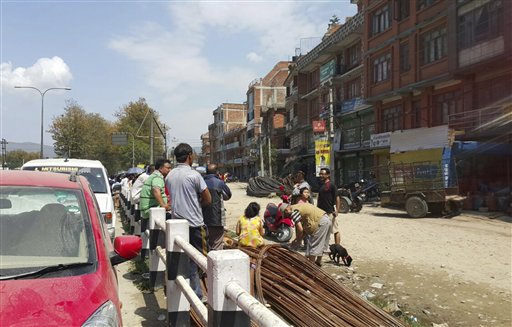
Nepalese people gather outdoors after another earthquake in Bhaktapur, Nepal, Tuesday, May 12, 2015. A major earthquake has hit Nepal near the Chinese border between the capital of Kathmandu and Mount Everest less than three weeks after the country was devastated by a quake. AP
KATHMANDU, Nepal — A major earthquake hit Nepal in a remote region near the Chinese border on Tuesday, killing at least four people less than three weeks after the country was ravaged by another deadly quake.
The U.S. Geological Survey said Tuesday’s quake hit in the early afternoon with a magnitude of 7.3 in an isolated, conservation area between the capital of Kathmandu and Mount Everest.
Several buildings collapsed in the isolated town of Chautara, with at least four people killed, according to Paul Dillon, a spokesman with the International Organization for Migration.
A rescue team from the agency has begun searching through the wreckage of the little town, he said.
Chautara has become a hub for humanitarian aid in the wake of a major April 25 quake that killed more than 8,150 people and injured more than 17,860 as it flattened mountain villages and destroyed buildings.
Tuesday’s quake was deeper, however, coming from a depth of 18.5 kilometers (11.5 miles) versus the April 25th quake that hit 15 kilometers (9.3 miles). More shallow earthquakes tend to cause more damage at the surface.
It was followed closely by at least five aftershocks measuring from magnitude 5.6 to magnitude 6.3.
The international airport in Kathmandu, which has become a transport hub for international aid, was closed temporarily, while traffic snarled in the streets of Kathmandu.
“The shaking seemed to go on and on,” said Rose Foley, a UNICEF official based in Kathmandu. “It felt like being on a boat in rough seas.”
Aid agencies were still struggling Tuesday afternoon to get reports from outside of the capital.
“We’re thinking about children across the country, and who are already suffering. This could make them even more vulnerable,” Foley said.
In the capital of Kathmandu, the quake sent people rushing outside of their homes. Police gave no immediate estimates of damage.
Indian Embassy spokesman Abhay Kumar said some buildings in Kathmandu collapsed, but he gave no further details about how many or where they were. Experts say the April 25 quake caused extensive structural damage even in buildings that did not topple, and that many could be in danger of future collapse.
Rasmus Baastrup, a Dane from Doctors Without Borders, said in a live interview with Denmark’s TV2 channel “I walked out quickly. I couldn’t run because the earth was shaking so much that it was impossible to run.” Baastrup, speaking from Kathmandu, said he had been told that all staff with Doctors Without Borders were alive but was not more specific.
Norway’s Red Cross, which was helping people from the April 25 earthquake at a 60-bed hospital in Chautara in central Nepal, said on Twitter in Norwegian that there were “many injured, several killed” and added that their hospital tents already has gotten patients.
“People are terribly scared. Everyone ran out in the streets because they are afraid of being inside the houses,” Norwegian Red Cross Secretary-General Asne Havnelid told Norwegian broadcaster NRK.
At the Norvic Hospital in Kathmandu, patients and doctors rushed to the parking lot.
“I thought I was going to die this time,” said Sulav Singh, who rushed with his daughter into the street in the suburban neighborhood of Thapathali. “Things were just getting back to normal, and we get this one.”
Nepalese have been terrified by dozens of aftershocks that hit the country in the days following the April 25 quake. Meanwhile, the impoverished country has appealed for billions of dollars in aid from foreign nations, as well as medical experts to treat the wounded and helicopters to ferry food and temporary shelters to hundreds of thousands left homeless amid unseasonal rains and unreachable with landslides blocking many mountain roads.
“This was a jolt just like the big one last month, though it was not that long,” said Kathmandu resident Avinav Shrestha. “I was very scared, though. Anything can happen.”
Strong shaking was also felt across northern India. In the Indian capital of New Delhi, people scrambled outdoors while buildings swayed.
Across the Nepalese border in Tibet’s Jilong and Zhangmu regions, the Earth shook strongly. Tremors were also felt slightly in the Tibetan capital, Lhasa.
“Rocks fell from the mountains,” Jilong county government vice chief Wang Wenxiang was quoted as saying by China News Service. “There might be some houses collapsed or damaged. We are now checking on the condition of the people.”